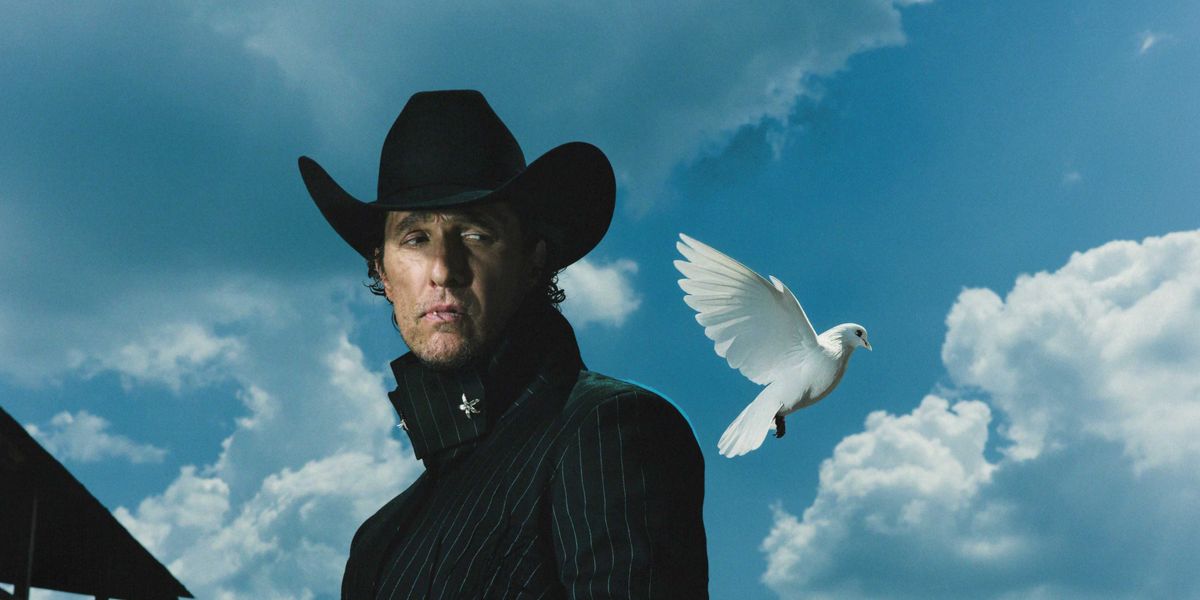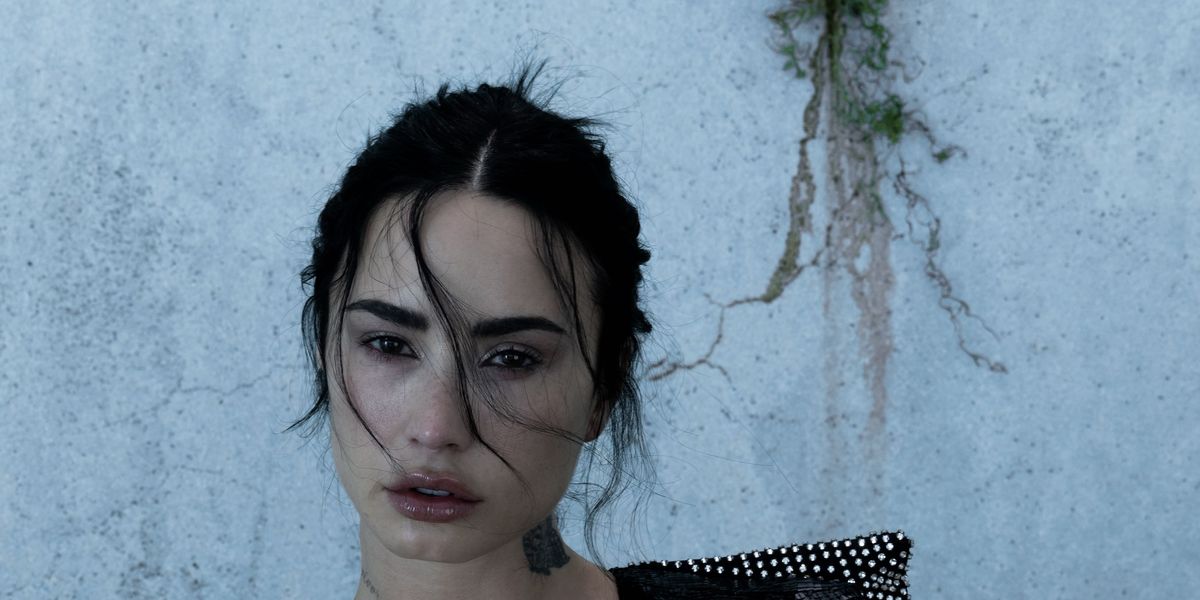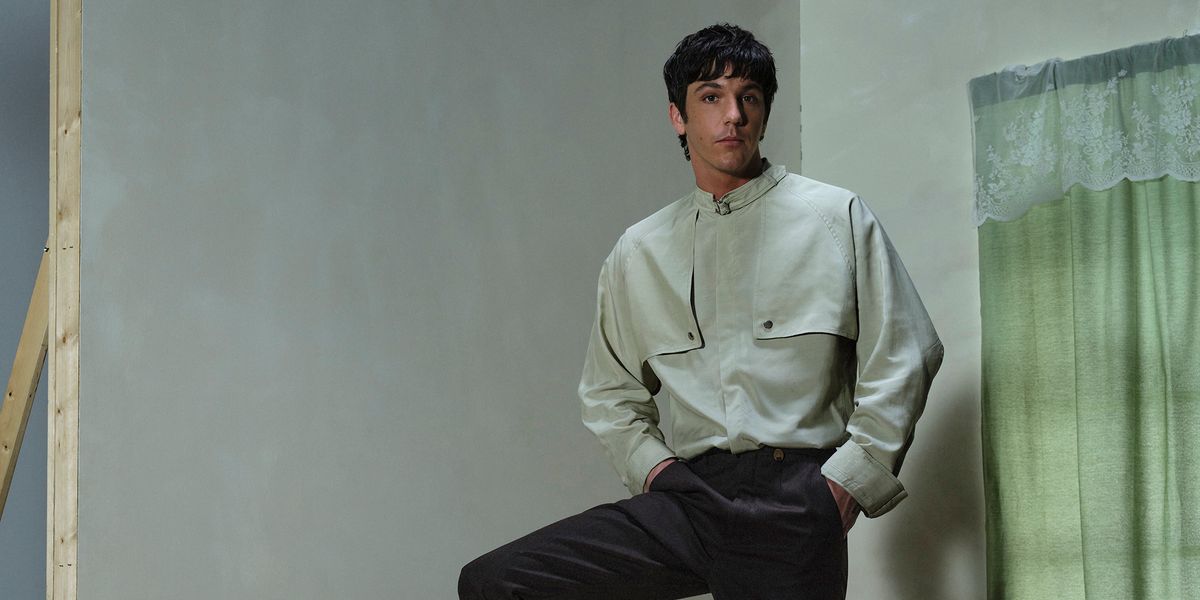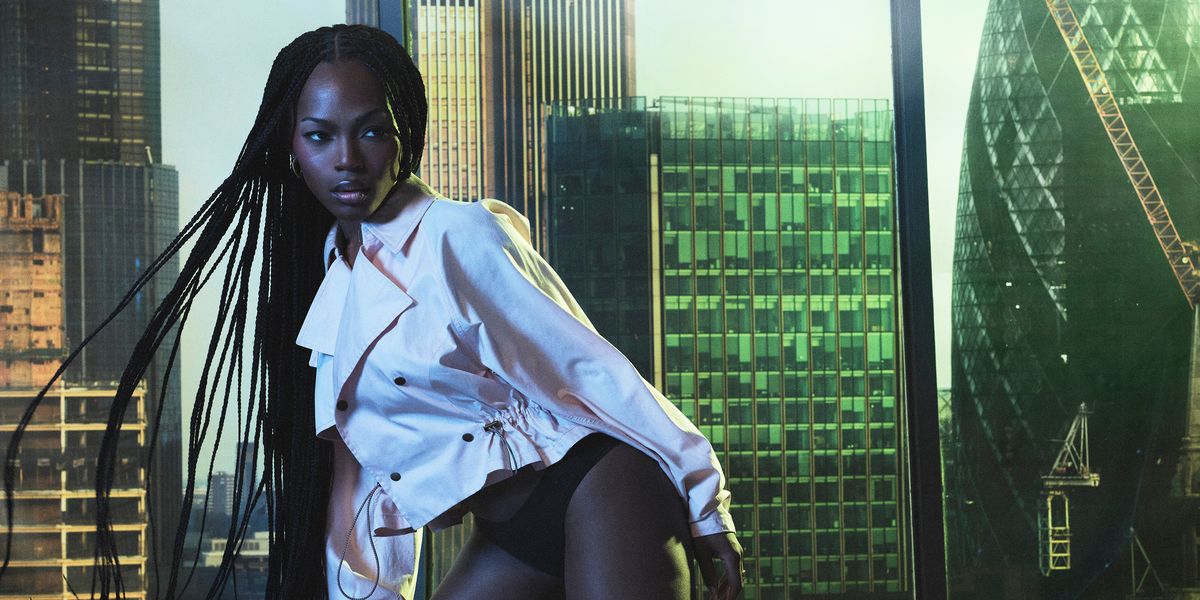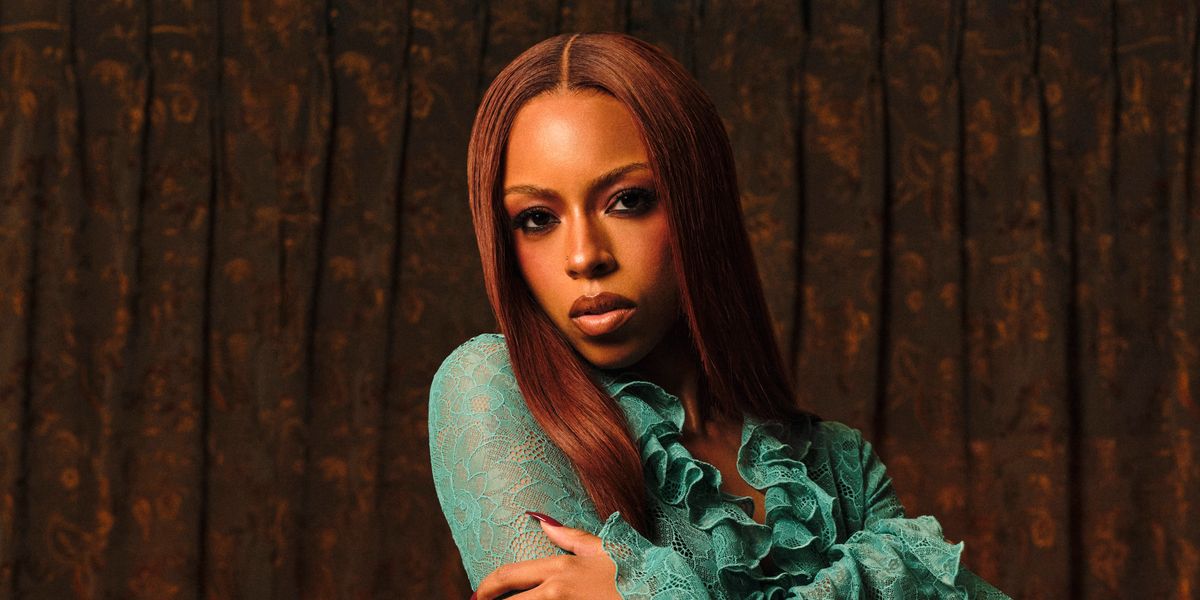
Amaarae’s Star Keeps Rising
By Tobias Hess
Oct 20, 2025The catchiest earworm of my summer wasn’t Olivia Dean's sticky-sweet refrain on "The Man I Need" or Justin Bieber's zeitgeist-defining croon on "Daisies."
Instead, it was the comically literal chorus on Amaarae’s “Starkillaz” (featuring Bree Runway and Starkillers) — a highlight cut from her newest album, Black Star — which features the singer delivering a line that is half-late-night recipe and half-musical spell; "Ketamine, coke and molly,” she squeaks over a relatively bare bed of drums and synth.
Those lyrics, which immediately reverberated across social media as both a meme and piece of iconography, strangely capture this remarkable era in Amaarae’s career: it's funny, digitally fried and in constant motion.
Her 2023 landmark album, Fountain Baby, found the Ghanaian-American musician on multiple year-end best lists and proved her enduring commercial appeal via hits like “Angels in Tibet.” Fountain Baby was lush, orchestral, and intricately composed; if it were a film, it would have been shot on a wide Vista Vision format. Black Star, on the other hand, is a deep web assemblage of references and digitized sonics, chopped, screwed, and Frankenstein-monstered into something new.
Her latest album is a rumination on electronic music, nightlife, and the musical threads that bind the African diaspora. To explore those connections, Amaarae and her team traveled to Brazil and spent extensive time in the Miami underground, where they excavated the “patterns” shared between diverse musical traditions.
“Music that’s popular in Salvador, Brazil is similar to [Ghanian] Highlife in the way they use specific shakers and percussion. All of these musical ideas are being passed from here to here because we all share a lineage,” Amaarae tells PAPER via Zoom from her Los Angeles home. “That's what I'm always trying to do with my music: connect the cultural dots, connect the lineage of music, connect the lineage of love and culture."
But even as she was embarking on this act of sonic scholarship, she was still keen to explore the universal theme of love. Songs like “B2B” or “Girlie Pop” display some of Amaarae’s most straightforwardly sentimental and desirous writing. “I'm just a girl that is yearning for and looking for love, commitment and partnership,” she says. “I’m always going to make love songs, because that's where my heart lies.”
That love is romantic, but it's also “communal." This record, which is meant to be listened to “in the company of others,” can act as an aphrodisiac towards that glorious collective feeling. “The cultural zeitgeist has become very sterile, cold and unkind especially online,” she says. “But when I go out into the world in real life, I see people yearning for connection in real ways and yearning for love and friendship.”
The love she so often thinks about is that of many of her fans in Ghana, who she names as the “outliers” of society.
“I take my platform very seriously when it comes to advocating, whether it's the lifestyles of young kids who are queer, or young kids that have run away because they're not allowed to express themselves in a certain way,” she shares. “I feel like I'm the poster child for all the weird alt kids that exist in Ghana that are living so far outside the lines to the point where sometimes their lives and their livelihoods are threatened.”
Her commitment to those kids exists independent of the day's headlines, but our current political moment, both globally and in the States where she primarily resides, lends that part of her project an even deeper resonance. She didn’t set out to make a "political record," but in a time like this, maybe the mere act of rooting your project in love, concern and connection is, itself, political.
PAPER sat down with the busy musician before the announcement of her tour, The Black Star Experience, to chat about her sonic studies, standing up for outliers, and what she learned from making music in Brazil.

Congrats on the record. I saw during the pre-release process that you said that this was the most fun you ever had releasing a record. How is the post-release hitting you?
Post-release has really been a lot of fun. It's cool to see people respond to it. Some have good responses, some have bad responses. It’s good to do community building. We threw a really great party with heads out here in LA and I just did my first Jimmy Kimmel spot.
I heard you're about to announce the forthcoming shows.
We're doing a couple bespoke shows for a few cities.
Is that gonna look different than your past shows?
Yes, absolutely. It's going to be a different configuration and speak to that community-building aspect. It's going to be way more fan-led and fan-involved.
I know you went to Brazil, as part of this process for Black Star. I'm curious what brought you there, and what connected you with the music and creativity there?
I loved Baile Funk for the last decade. I remember when I first heard it. I was like, Why is nobody up on this shit? Why aren't people trying to lean into working with Brazilian producers? Why isn't this music taking over the world? It's so fresh, it's so incredible, it's so uninhibited. Going to Brazil was just me saying, "If I'm gonna make an album that's going to have a lot of Baile Funk influence that I'm mixing with my Ghanaian influences, I want to go to the country and honor the craft by connecting directly with the people that make it. Whether that's producers, writers or everyday citizens of the country, I want to connect with those people and I want them to know that I came here to pay homage."
I spent some time in Sao Paulo, and the thing that struck me most was how much they just love music. There's a reason why “Come to Brazil” is a thing. They mean it.
They fucking mean it. They love music and they love life.
It’s interesting to me that you spent time there because the record is so hyperlocal — specific to Ghana, to Brazil to Miami — but it's also so global. I'm curious how you thought about blending the global with the hyperlocal in this album process?
Blending is such a natural and intuitive thing for me. I don't think too hard about it. When I put a song together, I draw influences from different places. I come at it from a deconstructed perspective. I have a song on the album called “100DRUM.” It has funk influences. And then it has a Ghanaian choir singing on top of it and then it's leaning towards melodic rap, and the kicks are bouncy like it's Hip Hop, but the pattern is Baile Funk and then it ends in Jersey Club. My songs are like a day in the life of my iPod; all the different things that I'm listening to happen in one song.
I see a pattern in the way music functions and works. Ghana and Nigeria established the first trading ports … if you go to Ghana, Portugal, Brazil, North Carolina, Virginia, New Orleans or to Alabama: what we all have in common is lineage. We've all taken bits and pieces from what is the original African sound, melody and percussion.
As slaves were sold, that music was passed on. In Brazil they play guitar similar to how we play Highlife in Ghana. Brazilian funk is 100% afrobeats sped up to 130 BM. Music that’s popular in Salvador, Brazil is similar to [Ghanian ] Highlife in the way they use specific shakers and percussion. All of these musical [ideas are] being passed from here to here to here to here because we all share a lineage. That's what I'm always trying to do with my music: connect the cultural dots, connect the lineage of music, connect the lineage of love and culture.
In this album, all these connections happen in a dance, club world. Talk to me a little bit more about your history with dance music, clubbing and nightlife.
I moved to Ghana in 2007. In 2009, the Azonto craze happened. Simultaneously, EDM and Electronica were taking over in America. So what started to happen was Azonto was infusing Hiplife drums with a lot of electronics and patterns. My introduction to dance music was the music that was happening in Europe that was being aired on television and on radio in Ghana, and then was being taken by Ghanaians to make our own interpretation.
Techno and house all started in Black America — Detroit and Chicago, right? My research into that led me to the idea that when I heard [this music in] 2009, it was so far removed from where it began [in the '80s]. I wanted to take it back and I wanted to [explore] how I got introduced to [electronic music], which is through fusion.
This record has a whole spectrum of emotions and themes and there’s a lot of partying, but I feel like this is one of your more yearning records too. Can you talk a little bit more about what you were exploring lyrically in relation to all these big sonic ideas that we're talking about?
Ultimately, I'm just a lover. That's really all that it is. I'm just a girl that is yearning and looking for love, commitment and partnership. When I think about [my previous album] Fountain Baby, I was going through an experience where I wasn't getting the love and the yearning that I was giving. It wasn't equal. Going into Black Star, I got the opportunity to experience a love that wasn't just equal, but transcendental. You can hear that in the music as well. I'm grappling with giving the future a chance and also making sense of the past and how that psychologically affected me. It all ends up in the fact that I just want to be loved. I just want to be in love with someone and I just want to give my all to someone. You hear that on tracks like “B2B,” “100DRUM,” and “She Is My Drug.” I’m always going to make love songs, because that's where my heart lies. What I'm most passionate about is the concept of love.

Is love always romantic to you, or are you saying "love" in another sense too?
Love in a communal way too. That's why these fan activations in real life have all been so communal. It's an event and you come and you hang out with me, you party with me, I DJ for you, I come out in the crowd, we hang out, we drink, we talk.
You see what's going on in the world. There’s so much bullshit happening every single day. Since 2020 we've been exposed to so much. As people, we're becoming numb. The cultural zeitgeist has become very sterile, cold and unkind, especially online, but when I go out into the world in real life, I see people yearning for connection in real ways and yearning for love and friendship. So for me, the love that I try to express is communal. I don't think that communal love is expressed as much in the lyrics, but it is expressed in the fact that this is a communal dance album. You're supposed to enjoy and experience it, not by yourself, but in the company and presence of others. That fosters connection.
I was thinking about how you're connecting dance and musical traditions, and with artists around the world; in our current politics, diversity is being demonized, but so is cross-cultural exchange, just to be inspired by someone else's creation or someone else's tradition. What you've done here is very subtly political.
So many people have said that to me. The idea of wanting to create something communal that connects cultures, especially given the fact that it's done with intentionality at this specific time, is political. I don't know if that was my intention when I first started, but I can see how standing up for love, given the time that we're in, is a political act. I'm proud to be doing what I'm doing. I'm proud to be who I am. I'm proud of the music and the message. We're in a world where the expression of love is now considered political because of how things have declined. It's a very sad world, but I'm proud to be an advocate of love. I'm proud to be an advocate of community.
You're existing in many different contexts. I’m curious how the music is resonating in Ghana versus here?
Things are very different in Ghana as far as my music goes. A lot of the kids that come out to my events in Ghana, who have asked me to host events, or give my time, are the outliers of society. I feel like I'm the poster child for all the weird alt kids that exist in Ghana that are living so far outside the lines to the point where sometimes their lives and their livelihoods are threatened. When I go to Ghana and I interact with fans or when I play the music for them, it's an act of anarchy. It's truly punk. In that space, it's defiant, but people also feel represented and seen by that music, because it's also music that's so far outside of what's being consumed and being made locally.
And then when I come to America or to Europe, to the Western world, there seems to be much more of a freedom, looseness, and an excitement that I think is more rooted in the fact that this is something fun and different. This is a space for all of us to share that feels good and feels fun. It's a more open and less aggressive response because [those audiences are] used to being seen and being heard and having their freedom. So for them, this is just another moment to let go and be free, whereas back home, the kids are like, “Wow, here's a new pathway and a new way forward to start thinking about music, art, sex, culture, love. This is someone who’s doing it, that's showing all of us a way out.” It's a different experience just due to different politics, lifestyles and societal norms.
That's a a really beautiful thing to bring home, but it's also a very heavy and serious thing. I'm curious how you hold on to that and whether it's a sense of responsibility that you carry?
In any situation where I'm representing not just Ghana, but Africa … When I look at some of my African peers, I'm the only one whose music is extremely different, whose visual identity is extremely different, and who truly represents the underrepresented, disrespected part of our society. My platform is so important to make sure that those faces are seen and those voices are heard and those beliefs are put forth.
That's been a huge part of my visual identity. I take my platform very seriously when it comes to advocating, whether it's the lifestyles of young kids who are queer, or young kids that have ran away from home because they're not allowed to express themselves in a certain way, or young kids that want to live outside of the box in in Africa and in Ghana specifically … it's a very strict and restrictive template and way of thinking. A lot of kids really struggle with expression, and a lot of kids are are led to drug use, alcoholism and suicide, just because of how difficult it is for kids to live truly and freely in their truth. So I don't fuck around with my platform at all and I know that there are kids that are excited and feel hope when I use my platform not just to speak but also to make them feel seen.
Photography by Jenna Marsh
From Your Site Articles
Related Articles Around the Web
Entertainment
Matthew McConaughey Found His Rhythm
Story by Joan Summers / Photography by Greg Swales / Styling by Angelina Cantu / Grooming by Kara Yoshimoto Bua
Story by Joan Summers / Photography by Greg Swales / Styling by Angelina Cantu / Grooming by Kara Yoshimoto Bua
30 September
Music
Demi Lovato Is No Joke
Story by Ivan Guzman / Photography by Jason Renaud / Styling by Chris Horan/ Makeup by Loftjet / Set design by Allegra Peyton
Story by Ivan Guzman / Photography by Jason Renaud / Styling by Chris Horan/ Makeup by Loftjet / Set design by Allegra Peyton
15 September
Music
Role Model Isn’t In Kansas Anymore
Story by Tobias Hess / Photography by Richie Talboy / Styling by Angelina Cantú / Grooming by Jerrod Roberts / Set design by Allegra Peyton
Story by Tobias Hess / Photography by Richie Talboy / Styling by Angelina Cantú / Grooming by Jerrod Roberts / Set design by Allegra Peyton
14 August
Internet
Quen Blackwell Takes Over
Story by Ivan Guzman / Photography by Richie Talboy / Styling by Angelina Cantú / Makeup by Kimora Mulan / Hair by Malcolm Marquez / Nails by Kimmie Kyees / Set design by Allegra Peyton
Story by Ivan Guzman / Photography by Richie Talboy / Styling by Angelina Cantú / Makeup by Kimora Mulan / Hair by Malcolm Marquez / Nails by Kimmie Kyees / Set design by Allegra Peyton
11 August
Music
Ravyn Lenae Enjoys the View
Story by Erica Campbell / Photography by Richie Talboy / Styling by Angelina Cantú / Makeup by Matthew Fishman / Hair by Jacob Aaron Dillon / Nails by Kimmie Kyees / Set design by Allegra Peyton
Story by Erica Campbell / Photography by Richie Talboy / Styling by Angelina Cantú / Makeup by Matthew Fishman / Hair by Jacob Aaron Dillon / Nails by Kimmie Kyees / Set design by Allegra Peyton
04 August
